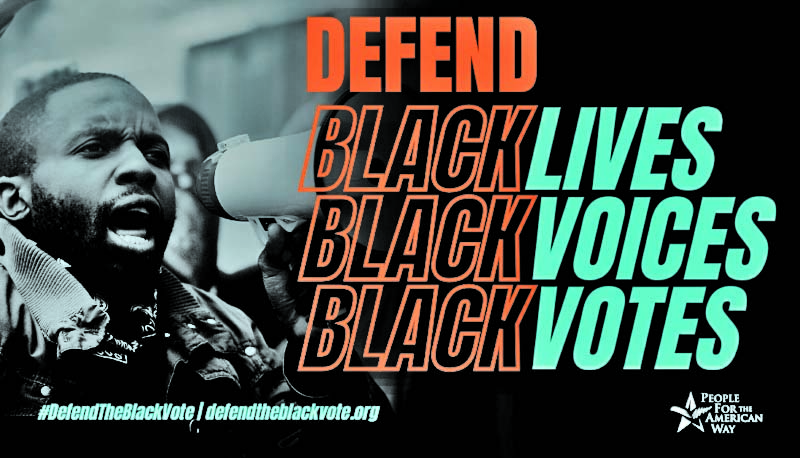The upcoming case that could destroy voting rights
by Keith Reed

If there was an enduring message from remarks Rev. William Barber made recently, in which he reminded an audience to not be distracted by the sometimes cartoonish personalities behind some of the worst political arguments of our time.
“They don’t like Trump because he’s saying out loud what you’re not supposed to say out loud. But they love the policies,” Barber said. The “they” are politicians and the powerful who know that Trumpism isn’t a new phenomenon but only the most modern rebrand of a strain of cynical politics whose lineage Barber sermonically traced back through the Nixon-era’s “Southern Strategy” and to the states’ rights arguments under which Southern conservatives banded together from Reconstruction through segregation.
Whether the vector was a blustering buffoon like Trump, a militant segregationist like George Wallace, or a shadowy political operative like Lee Atwater, the goal always was and remains the same: pick a scapegoat (Black folks, as a rule) and use the threat of their advancement to scare other people into voting for an agenda that only benefits the powerful. And if that means disenfranchising the vast majority of Americans of any stripe along the way, so be it.
This is a story about voting rights, and how millions of us are in jeopardy of losing them if an obscure case coming before the Supreme Court soon goes left.
That case, known as Moore v. Harper, comes from Barber’s home state of North Carolina, where Republican legislators are upset that courts at the state level tossed out their gerrymandered voting map. That’s not unusual: both political parties are guilty of trying to use redistricting to give themselves an advantage—although Republicans have been much more successful at it—and courts at the state and federal level have long held partisan legislators in check by ruling on the legalities of their maps.
What’s different about this case, though, is that some Republicans wanted to lose at the state level so they could try out a new legal strategy in front of the Supreme Court. The idea, per CNN, is to argue that the Constitution’s elections clause gives state legislatures almost total power over election procedures. If the stacked Supreme Court were to agree, it could open the door for states like Georgia and Texas, which enacted restrictive new voting laws based on baseless theories about voter fraud in 2020, or Florida, where Gov. Ron DeSantis’ new election police force was signed into law this year—to act without fear of reprieve from courts in their states.
Under the theory, state legislatures should be able to set rules in federal elections without being held in check by state constitutions either through interpretation by state courts or by the functioning of commissions created under state constitutional reforms.
Traditionally, legislatures have set ground rules for conducting an election, but have not acted alone or with the final word. Processes set in place have been subject to intervention by election administrators and state courts.
But the strictest reading of the independent state legislature theory says that state courts when it comes to federal elections, must stay out.
It’s a states’ rights argument that would’ve made former Mississippi Gov. Rees Barnett proud; even at the height of the battle over legalized segregation in the South, when Barnett argued that states’ rights literally existed before the states themselves, he didn’t go as far as arguing that that meant not even Mississippi judges were powerless against the legislature on voting.
More frightening, Republican state legislators wouldn’t stop there. The argument that state courts aren’t explicitly enabled by the Constitution to rein in wayward voting maps would almost certainly be tested for other applications. And if the courts are stripped of the ability to strike down gerrymandered voting districts, the same legislators who drew those districts could, theoretically, keep redrawing them to ensure they hold a majority, accountability be damned.
Marco’s Pizza, the nation’s fastest-growing pizza brand*, announces a multi-unit signed agreement that will bring seven new stores to the Roanoke and Lynchburg areas of Virginia over the next two and a half years. Multi-unit expansion with existing franchisees continues to lead Marco’s overall growth strategy, as the brand recently hit both development and sales milestones with the opening of its 1100th store and surpassing $1B in annual system-wide sales.
Franchisees Brandon Hudson and Damion Mason boast a 20-year friendship and have been with Marco’s for over five years and plan to build out the Greater
Lynchburg and Roanoke areas of Virginia as they grow their Marco’s portfolio. They currently have eight additional stores in development across the state, including a new store slated to open by the end of this year at 5817 Midlothian Turnpike in Richmond.
The best friend team has seen great success in the Richmond market and jumped on the opportunity to develop in the Roanoke and Lynchburg areas as untapped markets for Marco’s. Due in part to having one successful Marco’s location already in Greater Lynchburg, combined with an underdeveloped Marco’s market in Roanoke, the two cities showed prime potential for adding to Hudson and Mason’s multi-unit portfolio in Virginia.
“Damion and I have grown with Marco’s, joining when there were 700 stores to now with 1,100 stores and counting,” said Hudson. “Expanding with the brand as it continues to grow means that we get to help share the quality of Marco’s product with even more people. As one of the brand’s largest African American multi-unit operators, we’re excited to continue sharing our legacy for our families and the community.”
The first of the seven Marco’s locations planned for Roanoke and Lynchburg is slated to open by the end of this year, with the next three to follow in 2023 and all seven to be open in the next three years.





